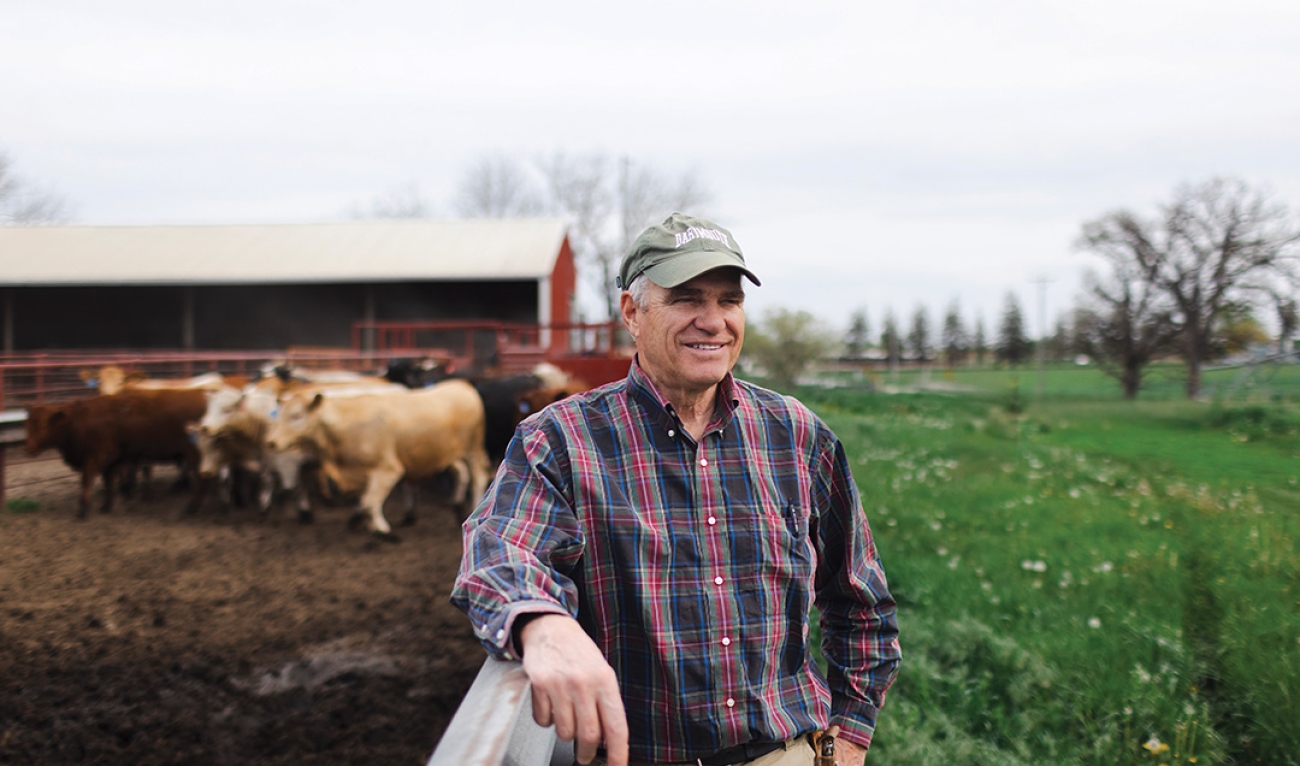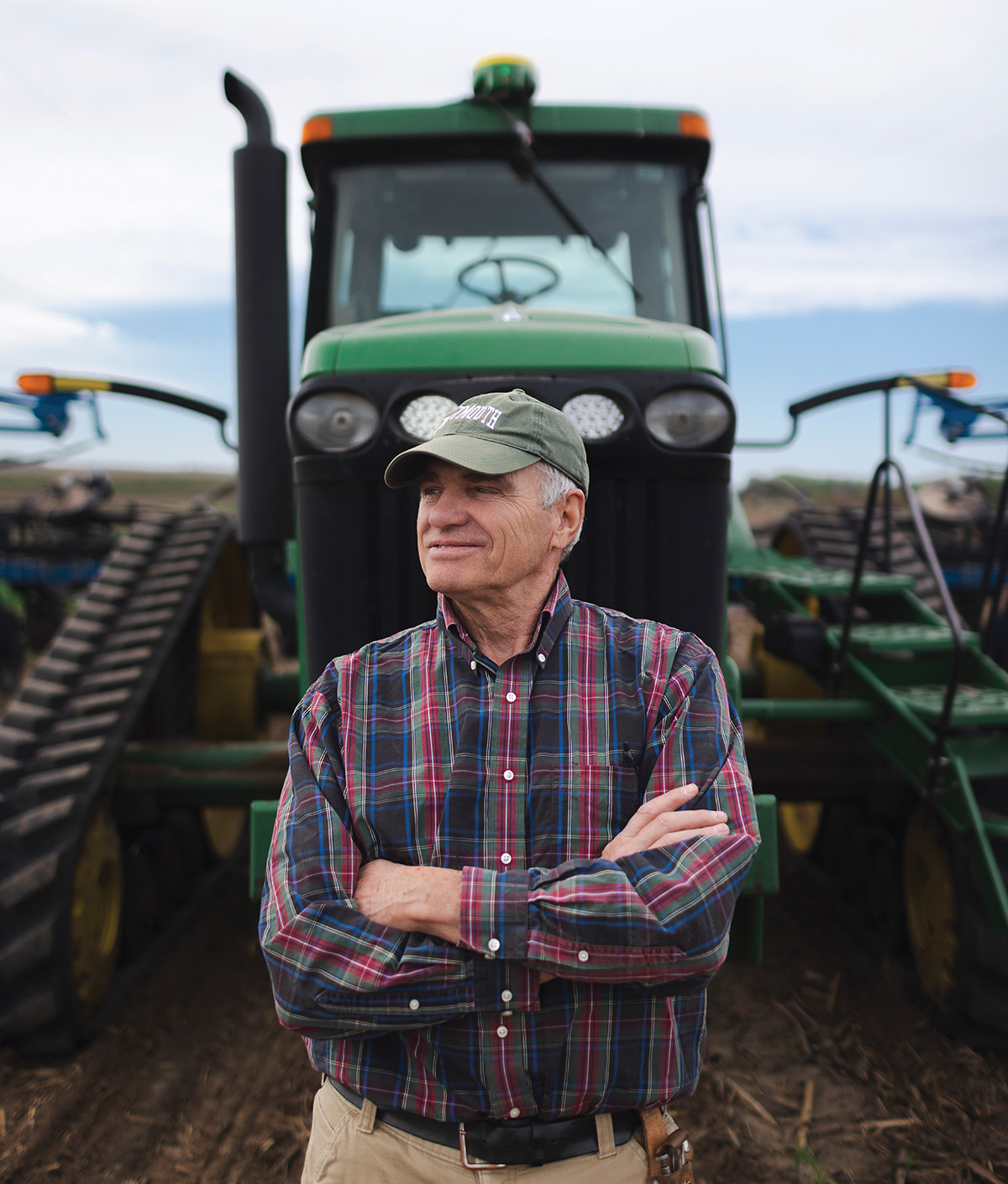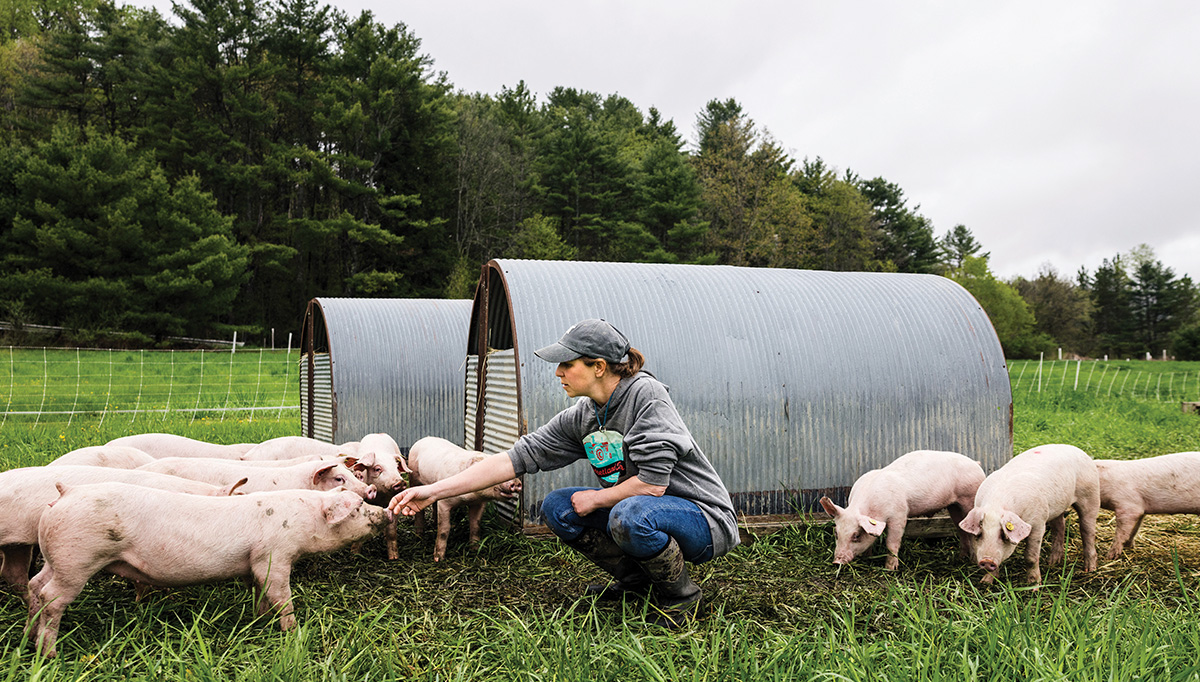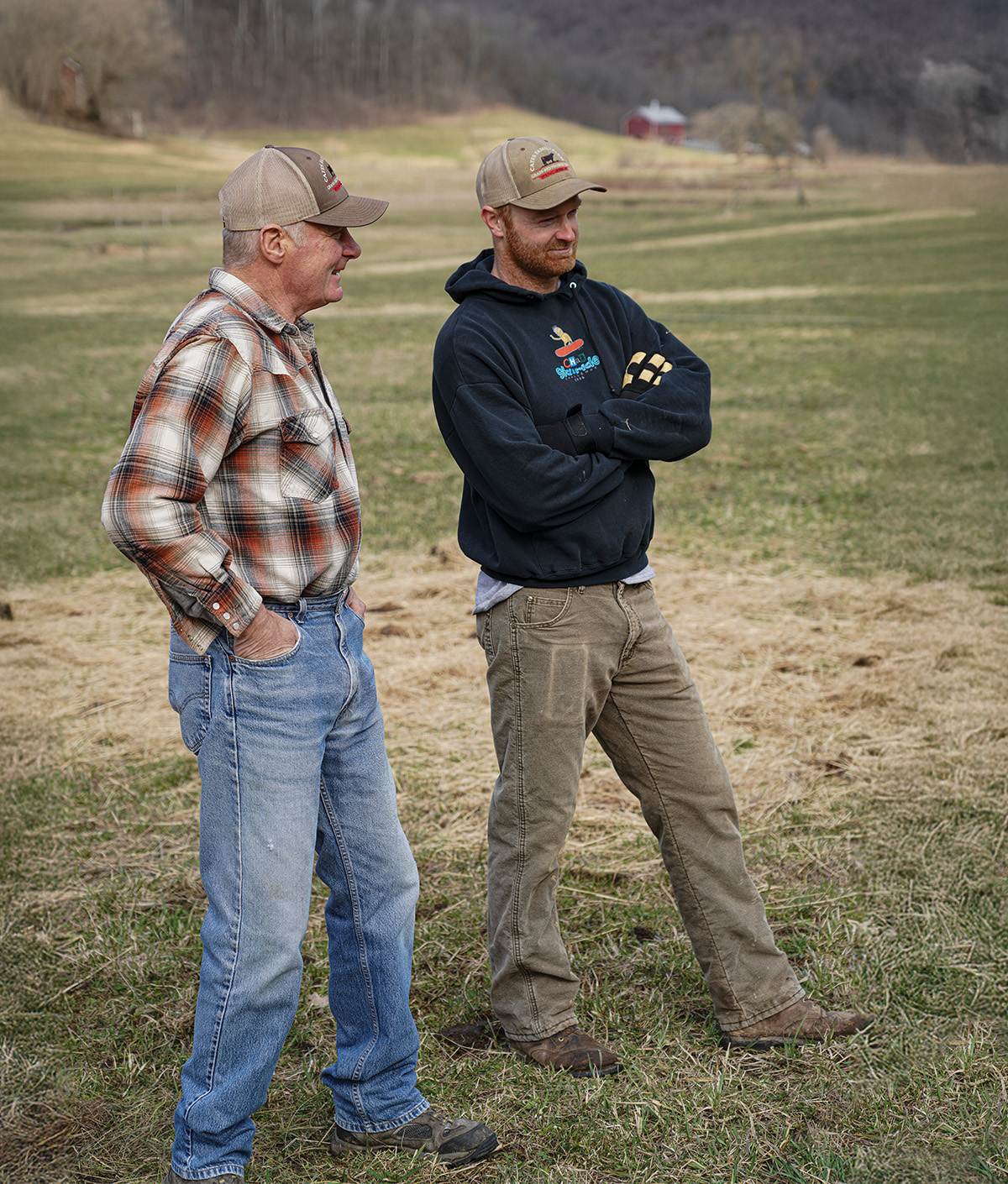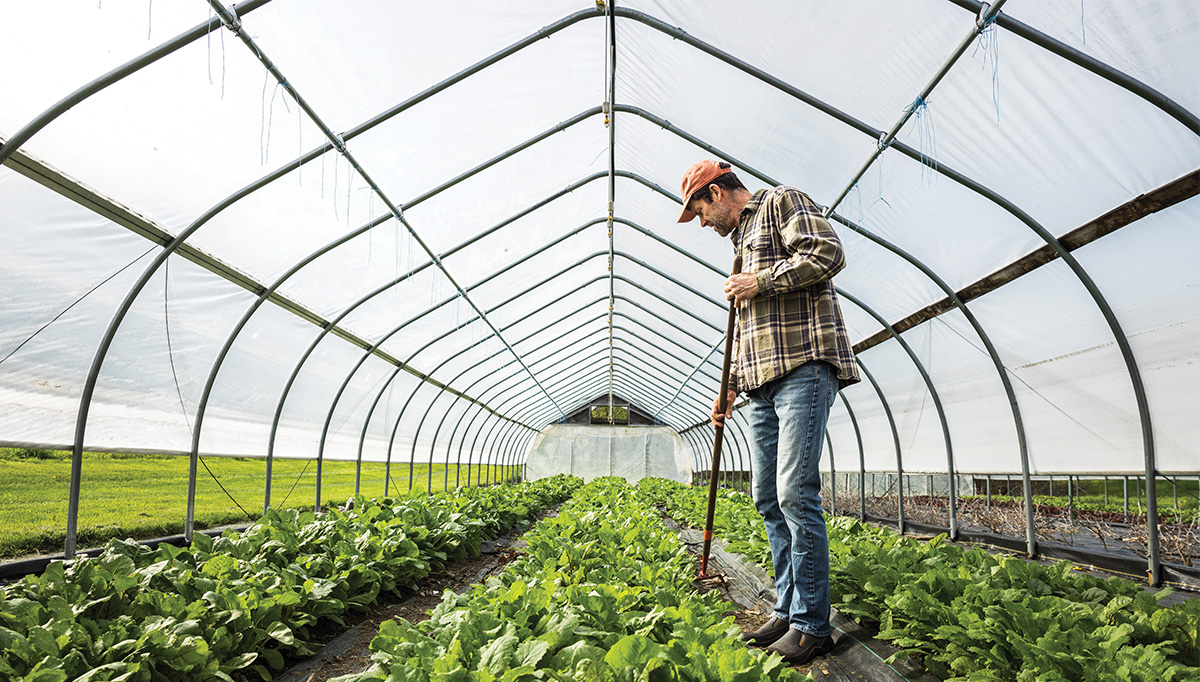Modern Farmer
Nick Hunt ’75
When Nick Hunt was 5, he would mimic what his father did on their family farm in the East Nishnabotna River Valley in southwest Iowa. “I’d pick up the grass, I’d make hay piles for the cattle, I’d run around with the staff,” he recalls. Clan Farms has been in his family since 1876, when Hunt’s great-grandfather purchased the original 250 acres. His father, Charles Hunt ’42, Tu’43, expanded the farm to 2,450 tillable and 200 nontillable acres. Hunt currently manages a herd of cattle and grows corn that mainly serves as feed.
Overseeing the farm with his wife, Sue, Hunt had learned a range of lessons from his father. “He taught me principles of accounting and the importance of knowing your costs and break-evens,” Hunt says. “I think he was ahead of his time and actually had a certified audit done on the farm, which was quite unusual back then.”
When a stroke debilitated his father, Hunt assumed responsibility in 1978. It was arduous work, especially for someone who had never run a business before. “When I took over, the farm had two nonfamily employees, and I struggled at first being a boss and learning how best to lead the team,” the history major says. “I wish I had had some human resource training.”
Today, Hunt’s responsibilities range from surveying the cattle, treating sick calves, working with plumbers and other contractors, meeting with his bank to ensure next year’s loan, and consulting with nutritionists and agronomists to find the ideal fertilizer for crops. “Every day is different and it’s a challenge,” he says. “You have to know a little about a lot of things as a farmer today.”
He doesn’t lean on just his own expertise. Hunt is actively involved as a director of Farm Credit Services of America and beef industry research group CattleFax and serves as a member of Iowa’s Master Farmer organization. He adds, “These three groups allow me to learn from others in the industry.”
In the past four years Hunt has been bringing climate-friendly practices to the farm, which also helps the bottom line. After the corn is harvested in the fall, he plants cover crops of cereal rye, leaving them on the field to decompose and enrich the soil. “Cover crops help build organic matter,” he says. “In addition, I get carbon credits for planting the rye, which helps pay for the seed.”
His succession plan is already in motion. Although close to retirement, Hunt is happy to be teaching his daughter’s husband how to run Clan Farms. “He has a real passion for it, which is always important for farming,” Hunt adds.
A family farm can achieve great success if the farmer considers how his or her ancestors worked to elevate the business from great to exceptional. “What’s always on my mind is, ‘I’m not going to fail and I’m going to make sure this farm continues its heritage.’ ” He pauses, smiles a wry grin. “Today’s American farmer has to be not only innovative but also hard working.”
Norah Lake ’06
From an early age Norah Lake knew the outdoor life was calling her. Raised in southern Vermont on a family homestead, she was enthralled by the massive garden and livestock grazing nearby. “I pretty much grew up with my feet in the soil,” she says. She also spent many hours on her high school’s farm, working in the woodlot and the dairy barn. “I got a lot out of that connection to the natural world,” Lake recalls.
Today she manages Sweetland Farm in Norwich, Vermont, offering an impressive array of crops grown on its 200 acres— including asparagus, zucchini, carrots, tomatoes, potatoes, beets, and squash—and a variety of pastured meats.
Lake and her husband bought the farm in 2012 from the Vermont Land Trust, which designated it a “conserved property.” That designation ensured the land would not be developed and would only ever be sold to a working farmer. Almost immediately Lake adopted the community-supported agriculture (CSA) model: She invites the public to buy a share of the harvest to help pay for upfront costs. Those subscribers then receive a portion of the harvest. By late spring this year Sweetland Farm had about 300 subscribers.
For more than five years Lake had worked at the CSA farm owned by Chuck Wooster ’89 in White River Junction, Vermont. “I learned the nuts and bolts of running a farm,” she says, “from harvesting the vegetables to running a business and managing a crew.”
An environmental studies major, Lake stresses that Sweetland Farm is dedicated to energy conservation. In 2018 she pledged to reduce the farm’s carbon emissions by 90 percent during the next decade. Nearly every barn roof on the property is outfitted with solar panels, irrigation pumps are being converted from fossil fuel to electric power, and she is installing a clean-burning woodchip boiler to heat the greenhouses, sourcing chips from the farm’s forest.
Lake helped fund these conversions like many farmers across the United States, securing grants via the Inflation Reduction Act.
“Grants like these are very important for farmers such as us, in a business where margins are very slim and capital improvements can make or break the farm,” she says. “Farms provide so many with social, aesthetic, and community-building services beyond simply growing food, and these grants are a way for farmers to be assisted with the costs.”
Sweetland Farm’s connection to the past is particularly fulfilling for Lake. She recalls stumbling upon photos from 100 years ago of the property, with its fields cleared and animals dotting the landscape. “I got that warm and fuzzy feeling knowing we’re continuing that tradition,” she says. It’s a tradition being passed down from one generation to another. Her 3-year-old daughter, Fern, is “growing up with the farm-kid lifestyle,” Lake says with a laugh, “and she loves to join me for field walks and learn about all the animals.”
When she considers a mentor beyond Wooster, who set her on the current agricultural trajectory, Lake name-drops Scott Stokoe, who managed the College’s organic farm for 17 years. “Scott is a real visionary and brought that mindset to his farming and teaching practices,” Lake says. “When he asked, ‘Do you know about tomatoes?’ you knew he was asking about something more nuanced and complex than just their obvious characteristics. Scott taught me to always ask questions and bring wonder to the daily grind of farm work.”
Dick Cates Jr. ’74, Eric Cates ’08
During Dick Cates Jr.’s first year at Dartmouth his father, Dick Sr. ’47, suggested he read A Sand County Almanac: And Sketches Here and There by environmentalist Aldo Leopold. “He told me, ‘This is important stuff. This is what working on the land, caring for the land, is all about,’ ” Cates remembers. The book, filled with essays on upholding a responsible relationship between people and the land they inhabit, has stayed with him. His email signature includes a Leopold quote: “When land does well for its owner, and the owner does well by his land, when both end up better by reason of their partnership, we have conservation.”
The Cates Family Farm of cattle covers 110 acres in Spring Green, Wisconsin. Cates Sr. bought it in 1967, setting his family on a path of farm ownership that continues today. A Dartmouth geography class with Bob Huke ’48, who taught about food insecurity and the politics of food, also helped steer Cates Jr., who majored in anthropology, into a lifetime of farming. Now son Eric partly owns the property with his wife and sister (who lives in California and doesn’t actively manage the farm). Dick decided to semiretire several years ago.
Eric was married on the farm in 2015 and wanted to return full time after a decade working as a ski coach. “I just felt the pull to come back,” the geography major says. “When I was a kid I got a taste of what it’s like to help my parents run the farm, and in 2016 I realized I could be my own boss.” His zeal inspired him to take a hands-on approach to supplying the farm’s grass-fed beef to Wisconsin households, retail partners, and wholesalers. “We do all the deliveries ourselves so we can meet face to face the chefs and homeowners who buy our product,” he says. “Making that connection is important to us.”
A commodity such as beef can be subject to market fluctuations, but Dick contends that farmers need to bring a hunger to the job despite occasional financial hardships. “You’re a successful farmer when you work with an enthusiasm and have an interest in innovation to make it work,” he says. Looking ahead, both Eric and Dick are optimistic the farm will stay in the family, especially after Eric buys his parents’ farmhouse, the hub of the Cates Family Farm.
Dick stresses the importance of keeping the farm open to the public. He is delighted young people get married at the farm. “They also want to camp out on the land or go on hikes because they’re curious about where their food comes from,” he says. “We want to show people how we get great joy from what we do. And we want to show that farming is such a valuable profession because, as much as you’re raising cattle to become food for folks, we also hope what we do inspires visitors to understand the responsibility of caring for the land. It’s all about land ethic.”
Chuck Wooster ’89
When Chuck Wooster discusses the benefits and challenges of running Sunrise Organic Farm in White River Junction, two key themes emerge. He loves meeting customers face-to-face and finding out what motivates them to buy his harvest’s output. But he thought the profit margins would increase with time. Despite the financial struggle of running a modern American farm, he remains undeterred.
“One of the reasons I got into farming was to interact with folks,” he says, “and it’s important to have those moments because of the commitment they made to us.”
He says some farmers prefer to sell their vegetables to wholesalers and rarely have that connection with customers. “But for us, the ethos we are after is going local, tying the land to the community.”
Like a storm cloud hanging over his property, the difficulty of turning a profit remains a front-burner anxiety. “It’s been a disappointment how marginal this line of work can be, but then again, I really didn’t expect to get rich quick.” Wooster owns two farmsteads within a mile of each other, with the first 100-acre hilltop dairy farm operating since 1999. Seven years ago he and his wife, Sue Kirincich ’92, who doesn’t work on the farm, bought an old dairy farm and added it to the Sunrise Organic portfolio. His harvest includes vegetables, beef, lamb, pigs, and maple syrup.
Like Norah Lake’s Sweetland Farm, Wooster’s farm operates under the CSA model, which allows his 400 members to purchase “shares” of his farm and pick up organic vegetables weekly. “I really like this approach because you have members who share the financial risk with you.” Wooster says. “They put the money upfront, which is when we need it.” This approach also generates a sense of camaraderie. He adds that word of mouth is vital for CSA farms, and customers are attracted to “a farm with the kind of community values they feel aligned with.”
Folding sustainable agricultural practices into his farm is also important to Wooster, who majored in earth sciences and environmental studies. He has installed solar panels and estimates all power for the two farm sites will be photovoltaic by the end of summer. He and his staff also try to use hand-powered tools as much as possible to cut back on diesel. These shifts are “absolutely essential for us,” he adds. “It’s the reason we do this style of farming—we want to keep these skills alive and demonstrate that it can be done.”
Volatile weather patterns stemming from climate change pose serious roadblocks to profitability. “Now we have big irrigation ponds and flood-control ditches in order to be ready for any monsoons or droughts,” he says. “That’s something farmers didn’t have to worry about 30 years ago, so that’s increased our expenses and uncertainty.” He notes the global scale of climate change impacts also hurts Big Ag. “It’s conceivable this disruption may be more favorable to smaller growers than large ones, since we can move quickly on many things.”
David Silverberg is a Toronto-based writer who covers business and agriculture for news outlets such as BBC News, Ambrook Research, Food Dive, and the Toronto Star.

